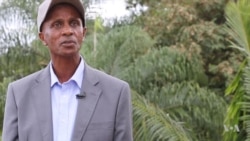Ethiopian authorities have arrested journalist Eskinder Nega nine times on charges that include treason, terrorism and genocide. But Nega tells VOA the abuse won’t stop him from writing critically about the government.
“Without freedom of expression, freedom is just impossible,” said Nega. “It starts from there. You have to be able to express yourself.”
Nega’s latest release was on April 5, just days after a new prime minister, Abiy Ahmed, was sworn in — raising some hopes for change. “He has given us promise,” agreed Nega. “We need him to deliver on those promises. We haven’t seen anything in action up to now,” he added cautiously.
Nega might have reason to be skeptical. Ethiopia consistently ranks low on the annual global press freedom index compiled by Reporters Without Borders, and the government's behavior is increasingly common across East Africa.
Activists say laws on terrorism and national security are increasingly being used across the region to restrict the media and encourage self-censorship.
“Looking at Kenya, Tanzania, Rwanda and Burundi, up to about three, four years ago, [they] were really the jewels of the continent,” said Amnesty International’s regional director in Nairobi, Joan Nyanyuki. “You know, everybody, West African countries were told, ‘Oh, why can’t you emulate your East African counterparts?’ But, I feel like now the applause has gone to our heads. And, the Western countries need to stop applauding and [start] asking us the hard questions.”
Among East African countries, RSF ranked Burundi and Rwanda the lowest at 159 and 156 out of 180 countries this year.
In Tanzania, said Nyanyuki, the space for media freedom is closing at a very fast pace.
RSF dropped Tanzania’s ranking for press freedom this year a full 10 spots, from 83 to 93.
Tanzanian authorities suspend popular radio stations for airing material deemed to incite the public and disturb the peace while bloggers face similar new restrictions.
Media who dare to question the government are shut down, said Tanzania’s Legal and Human Rights Center’s Hellen Kijo Bisimba.
“There are some newspapers which were banned,” she noted. “Some of them three, three years. And some of them for several months. And others for good.”
In Uganda, the Human Rights Network for Journalists has collected video of police brutally attacking and beating reporters in the last few years. The rights group’s coordinator, Robert Ssempala, says the police continued to be the top violator of press freedom in 2017.
“The police [force] was cast in very bad light because it was responsible for 83 cases of the 113, representing 73 percent,” he said.
Uganda police spokesman Emilian Kayima denied there is impunity for police who attack the press.
“We’ve taken them to court, we’ve investigated those cases,” he said. “Courts have found them guilty, have sentenced them, and off they go. That shows the will on the part of the police,” adds Kayima.
RSF dropped Uganda’s 2018 press freedom ranking five spots to 117, citing security services targeting of journalists.
Some in the region are pushing back against legal restrictions and government pressure.
The weeklong blackout of four independent broadcasters this year in Kenya drew intense criticism. Lawyers protested in February as the government defied court orders, including the order to lift the suspension on the TV channels.
This year, RSF lowered Kenya’s press freedom ranking by one spot to 96 for what it called a slow erosion of media freedom.
Citizens should care when press freedom is restricted, said Amnesty’s Nyanyuki.
“Citizens really need to stand up and own that freedom of the press as one of the things that will protect them and will enable them to go further in terms of development and safeguarding and protecting their own rights. So, freedom of the press is really the freedom of every ordinary citizen in the region,” she said.
People are beginning to wake up to concerns about a free press, said Nyanyuki, so there is cause for optimism.
Halima Athumani, Francis Mukasa and Khaleed Abubakar contributed to this report.






